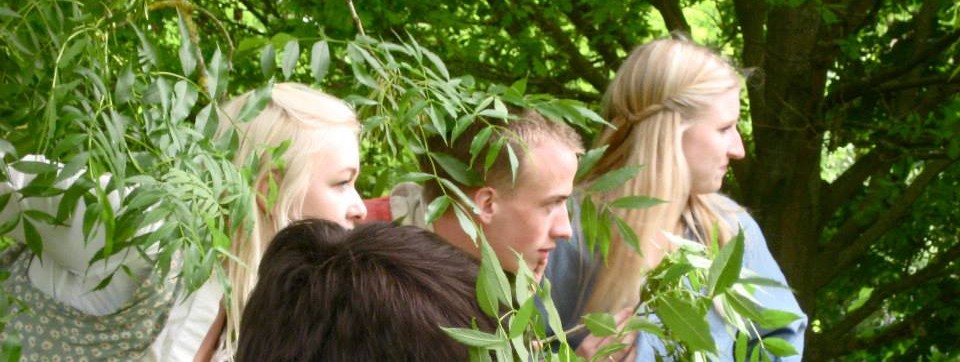WUDS Tames the Shrew
Shakespeare in the sun: what more could a theatre-goer want? Warwick University Drama Society (WUDS) offered us their rendition of The Taming of the Shrew, perhaps one of Shakespeare’s more controversial comedies. It follows the gutsy attempts of the wilful, young Petruchio (Stewart Nunn) as he attempts to woo and indeed, tame, the notorious Katherina (Laura Bird) for both the challenge and monetary gain, following a bet. The narrative is somewhat problematic in terms of gender relations for performers today and yet, from the outset, WUDS’ director Amanda Fawcett handled the material with a modern sensibility while remaining faithful to the Elizabethan setting.
Starting on the Piazza, you would have been forgiven for thinking it was going to be a promenade performance. While strolling down to Tocil Woods, audience members were welcomed by a number of talented musicians in Elizabethan garb. The pleasant blends of an accordion, violins and tambourines produced a merry score that remained consistently impressive throughout the production. Later on, the live music married well with the comic physicality onstage by emphasising the violence between master and servant, a Shakespearian trope that Fawcett’s direction capitalised on with success.
The play opened with the image of a drunken Sly (Jim Burrows), slumped against a tree and kitted up in a Fresher’s 2012 t-shirt. He was limply holding a bottle of Bulmers. This pairing of modern features within the Elizabethan setting demonstrated that this performance was unafraid of being self-referential and parodic. There was even some very effective androgynous casting in the form of Sly’s very conspicuous ‘wife’ (Jamie Wright).
The cast mastered the Bard’s verse with great skill and gravitas. The combination of puns and witticisms in Shakespeare’s language came together with the performers’ exaggerated gestures and resulted in some very comic, and sometimes crude, sequences. Moments such as when Petruchio’s hilarious servant Grumio (Jack Morning-Newton) offered his assistance, to the point of literally becoming his master’s horse, was particularly memorable. The predominantly minimal use of props meant that when they were used in excess it was outlandish and visually unique, the perfectionist demands Petruchio made of his tailor being a particular highlight.
The sub-plot of Katherina’s sister, Bianca, being wooed by a succession of three suitors was to equal the performance of Katherina’s ‘taming’. The suitors each had unique and entertaining characteristics. Gremio was played with playful pomposity by Ed Franklin; Hortensio, by Michael Haddad, was played with hilarious lasciviousness. Finally, Dan Hutton’s Lucentio was performed with an endearing charm that succeeded in gaining Bianca’s love, albeit with the help of the artful Tranio (Will Barratt).
Unsurprisingly for a text written by the Bard, the ingredients of his comedic plot are complicated, as demonstrated by many of the characters swapping identities. The exposition of these intricate plot details was handled delicately, however, so even if you weren’t well-versed in Elizabethan drama you could find yourself laughing along.
How then was the traditionally misogynistic ending of the play dealt with? Tactfully, I can assure. Laura Bird’s Katherina echoed some of the successful portrayals of Beatrice in Shakespeare’s later comedy Much Ado About Nothing. A grounded sense of self-assuredness was evident in Bird’s performance and, even when Petruchio began to manipulate Katherina into complacency, Bird maintained her strong demeanour. The impression was that Katherina’s obedience to Petruchio was knowingly done for her own romantic and economic benefit and not for conformity’s sake. A triumph and all in all a very entertaining production, enhanced by the fortune of good weather.

Comments